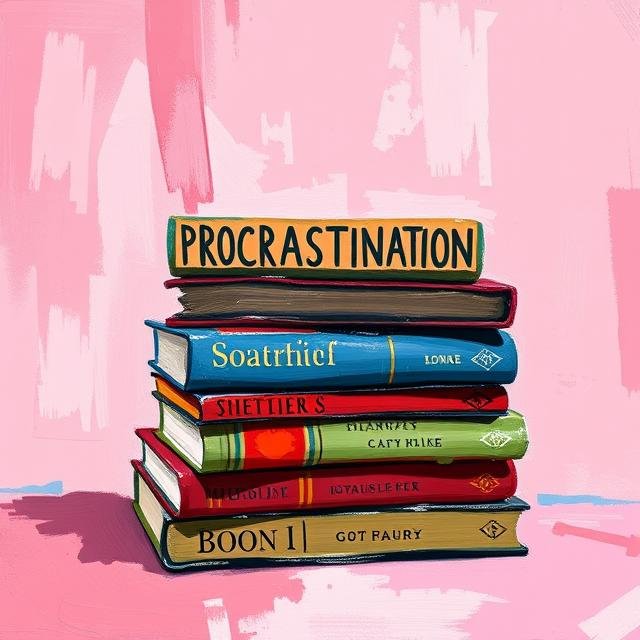Procrastination: that all-too-familiar feeling of putting things off, even when you know you shouldn’t. If you’re tired of the “I’ll do it later” cycle and genuinely want to take control, a good procrastination book can be a game-changer. But with so many titles out there, how do you find a book about procrastination that offers more than just theory – one that actually provides actionable anti-procrastination strategies? We’ve dived into the options to bring you some of the best book for procrastination choices that are packed with practical advice to help you get moving in 2025.
- Why Turn to a Procrastination Book for Help?
- Top Procrastination Book Picks to Get You Started
- “Eat That Frog!” by Brian Tracy
- “The Now Habit” by Neil Fiore, Ph.D.
- “Atomic Habits” by James Clear
- “Indistractable: How to Control Your Attention and Choose Your Life” by Nir Eyal
- “Solving the Procrastination Puzzle” by Timothy A. Pychyl, Ph.D.
- “The War of Art” by Steven Pressfield
- “Deep Work: Rules for Focused Success in a Distracted World” by Cal Newport
- “Getting Things Done: The Art of Stress-Free Productivity” by David Allen
- “The Willpower Instinct: How Self-Control Works, Why It Matters, and What You Can Do to Get More of It” by Kelly McGonigal, Ph.D.
- “Finish: Give Yourself the Gift of Done” by Jon Acuff
- How to Choose the Right Procrastination Book for You
- Beyond the Book: Implementing What You Learn
- Summarizing Top Picks: A Quick Reference Table
- Cultivating a Mindset for Action
- When a Book Isn’t Enough: Seeking Further Support
- Final Thoughts: Turning Pages into Action and Overcoming Procrastination
- FAQs: Your Questions About Procrastination Books Answered
- References
Why Turn to a Procrastination Book for Help?
You might wonder if a book can truly help with something as ingrained as procrastination. The answer is a resounding yes! The right books offer:
- Understanding: They delve into the psychology of delay, helping you understand why you procrastinate.
- Actionable Techniques: The best ones provide concrete strategies for overcoming procrastination.
- Motivation: Reading success stories and learning new approaches can be incredibly motivating.
- Structure: They often provide frameworks or step-by-step guides for behavioral change.
What Makes a “Best Book for Procrastination”?
- Practical Advice: Goes beyond theory to offer usable tips.
- Author Credibility: Written by experts in psychology, productivity, or habit formation.
- Relatability: Addresses common struggles and offers empathetic solutions.
- Focus on Action: Emphasizes taking steps rather than just understanding the problem.
Top Procrastination Book Picks to Get You Started
Here’s a rundown of highly recommended books about procrastination, known for their impactful insights and action-oriented guidance. These are great resources for anyone looking to improve their task management skills.
“Eat That Frog!” by Brian Tracy
- Why it helps: This classic productivity book is all about tackling your most challenging task (your “frog”) first thing in the morning. It provides 21 practical tips on procrastination and how to stop delaying important tasks and get more done.
- Key takeaway: Prioritize and conquer your biggest hurdles early to build momentum.
- Best for: People who struggle with prioritizing or feel overwhelmed by large tasks.
“The Now Habit” by Neil Fiore, Ph.D.
- Why it helps: Fiore’s book about procrastination delves into the psychological roots, particularly the fear of failure and perfectionism. It offers strategies like “unscheduling” and focusing on starting, rather than finishing, to reduce anxiety and build positive work habits.
- Key takeaway: Procrastination is often a coping mechanism for stress; focus on guilt-free play and starting small.
- Best for: Individuals whose procrastination stems from anxiety, perfectionism, or feeling overwhelmed.
“Atomic Habits” by James Clear
- Why it helps: While not solely a procrastination book, Clear’s work on habit formation is essential for overcoming it. He provides a framework for building good habits and breaking bad ones through small, consistent changes (atomic habits).
- Key takeaway: Small, incremental improvements lead to remarkable results over time. Focus on systems, not just goals.
- Best for: Anyone looking for a systematic approach to building better work habits and breaking the procrastination cycle.
“Indistractable: How to Control Your Attention and Choose Your Life” by Nir Eyal
- Why it helps: Eyal explores the psychology of distraction – a close cousin of procrastination. He offers practical techniques to manage internal and external triggers, helping you stay focused on what truly matters.
- Key takeaway: Becoming indistractable is about understanding and managing the root causes of distraction, not just fighting symptoms.
- Best for: Those who find themselves constantly sidetracked by technology or internal thoughts.
“Solving the Procrastination Puzzle” by Timothy A. Pychyl, Ph.D.
- Why it helps: Pychyl is a leading researcher in procrastination psychology. This book offers a concise, science-backed look at why we procrastinate (often emotional regulation) and provides evidence-based strategies for taking action.
- Key takeaway: Understand the emotional drivers of your delay and use targeted strategies to manage them.
- Best for: Readers who appreciate a scientific yet accessible approach to understanding and tackling procrastination.
“The War of Art” by Steven Pressfield
- Why it helps: Pressfield identifies “Resistance” – the internal force that stops us from pursuing our creative and entrepreneurial goals (a major form of procrastination). This book is a powerful, motivating kick-in-the-pants for anyone struggling to start or finish creative work.
- Key takeaway: Recognize Resistance as the enemy and develop strategies to battle it daily.
- Best for: Creatives, writers, artists, entrepreneurs, or anyone facing internal blocks to doing meaningful work.
“Deep Work: Rules for Focused Success in a Distracted World” by Cal Newport
- Why it helps: Newport argues that the ability to focus without distraction on a cognitively demanding task (deep work) is becoming increasingly rare and valuable. He provides rules to cultivate this skill, which inherently combats procrastination driven by shallowness.
- Key takeaway: Cultivate the ability to perform deep work to produce high-quality output and find more fulfillment.
- Best for: Knowledge workers and anyone looking to improve focus and concentration in a world full of distractions.
“Getting Things Done: The Art of Stress-Free Productivity” by David Allen
- Why it helps: The GTD methodology is a comprehensive system for capturing, clarifying, organizing, reflecting on, and engaging with all your tasks and commitments. By getting things out of your head and into a trusted system, you reduce overwhelm, a common cause of procrastination.
- Key takeaway: A systematic approach to managing tasks reduces mental clutter and stress, freeing you up to take action.
- Best for: Individuals who feel overwhelmed by too many commitments and need a robust system for task management.
“The Willpower Instinct: How Self-Control Works, Why It Matters, and What You Can Do to Get More of It” by Kelly McGonigal, Ph.D.
- Why it helps: This book explores the science of self-control and willpower, offering insights into why we give in to temptation (like procrastinating) and practical exercises to strengthen our “willpower muscle.
- Key takeaway: Willpower isn’t just about gritting your teeth; it’s a mind-body response that can be trained.
- Best for: Those interested in the science of self-discipline and looking for exercises to improve it.
“Finish: Give Yourself the Gift of Done” by Jon Acuff
- Why it helps: Acuff tackles the problem of perfectionism, a major driver of procrastination, especially when it comes to finishing projects. He offers humorous and practical advice on how to overcome the fear of not being perfect and actually complete what you start.
- Key takeaway: Perfectionism is the enemy of done. Aim for finished, not flawless.
- Best for: Perfectionists who start many projects but struggle to finish them.
How to Choose the Right Procrastination Book for You
With so many options, consider these factors:
- Your Primary Procrastination Reasons: Are you driven by fear, boredom, overwhelm, or lack of focus? Choose a book that addresses your specific triggers.
- Preferred Learning Style: Do you prefer science-backed explanations, actionable step-by-step guides, or motivational stories?
- Time Commitment: Some books offer quick wins, while others propose more comprehensive systems.
Beyond the Book: Implementing What You Learn
Reading a book about procrastination is a great first step, but the real change comes from applying the knowledge.
Taking Notes and Identifying Key Action Steps
As you read, jot down the strategies that resonate most with you.
Starting Small with One or Two Techniques
Don’t try to implement everything at once. Pick one or two key takeaways from your chosen procrastination book and focus on integrating them into your routine.
Tracking Your Progress and Adjusting
Monitor how the new techniques are working. Be willing to adjust your approach. This is part of building effective motivation strategies.
Summarizing Top Picks: A Quick Reference Table
| Procrastination Book Title | Author | Key Focus | Great For… |
|---|---|---|---|
| “Eat That Frog!” | Brian Tracy | Prioritization, Tackling hard tasks first | Overwhelm, Prioritization struggles |
| “The Now Habit” | Neil Fiore | Psychology of delay, Guilt-free play | Anxiety, Perfectionism |
| “Atomic Habits” | James Clear | Building small, consistent habits | Habit formation, Long-term change |
| “Indistractable” | Nir Eyal | Managing distractions, Internal/external triggers | Easily distracted individuals |
| “Solving the Procrastination Puzzle” | Timothy A. Pychyl | Science of procrastination, Emotional regulation | Those wanting a research-backed approach |
| “The War of Art” | Steven Pressfield | Overcoming “Resistance,” Creative blocks | Creatives, Entrepreneurs |
| “Deep Work” | Cal Newport | Focused work, Minimizing shallow tasks | Knowledge workers, Improving concentration |
| “Getting Things Done” (GTD) | David Allen | Task management system, Reducing overwhelm | People needing a comprehensive system |
| “The Willpower Instinct” | Kelly McGonigal | Science of self-control, Strengthening willpower | Improving self-discipline |
| “Finish” | Jon Acuff | Overcoming perfectionism, Completing projects | Perfectionists, Chronic non-finishers |
Cultivating a Mindset for Action
Remember, the best book for procrastination is the one that inspires you to make a change. It’s about more than just reading; it’s about internalizing the lessons and consistently applying the strategies to build new, more productive habits. This commitment to behavioral change is key.
When a Book Isn’t Enough: Seeking Further Support
If you find that even after reading and trying to implement strategies from a procrastination book, you’re still struggling significantly, consider seeking support from a coach, therapist, or counselor. Sometimes deeper underlying issues contribute to chronic procrastination.
Final Thoughts: Turning Pages into Action and Overcoming Procrastination
A good book about procrastination can be a powerful ally in your journey to become more productive and less prone to delay. By understanding the psychology behind why you put things off and arming yourself with actionable techniques from these top reads, you can start building the habits that lead to real, lasting change. Choose a procrastination book that speaks to you, commit to its lessons, and start taking action today!
FAQs: Your Questions About Procrastination Books Answered
What is the most famous book about procrastination?
Can reading a procrastination book actually cure my procrastination?
Are there any procrastination books specifically for students?
What if I procrastinate on reading the procrastination book itself?
Beyond a book about procrastination, what's one simple tip to start taking action?
References
- Tracy, B. (n.d.). Eat That Frog!: 21 Great Ways to Stop Procrastinating and Get More Done in Less Time. Brian Tracy International.
Available on Amazon - Fiore, N. (2007). The Now Habit: A Strategic Program for Overcoming Procrastination and Enjoying Guilt-Free Play. TarcherPerigee.
Available on Amazon - Clear, J. (n.d.). Atomic Habits: An Easy & Proven Way to Build Good Habits & Break Bad Ones. James Clear.
https://jamesclear.com/atomic-habits or Amazon - Eyal, N. (n.d.). Indistractable: How to Control Your Attention and Choose Your Life. Nir and Far.
https://www.nirandfar.com/indistractable/ or Amazon - Pychyl, T. A. (n.d.). Solving the Procrastination Puzzle: A Concise Guide to Strategies for Change. Procrastination.ca.
https://procrastination.ca/solving-the-procrastination-puzzle/ or Amazon - Pressfield, S. (2002). The War of Art: Break Through the Blocks and Win Your Inner Creative Battles. Black Irish Entertainment LLC.
https://stevenpressfield.com/books/the-war-of-art/ or Amazon - Newport, C. (n.d.). Deep Work: Rules for Focused Success in a Distracted World. Cal Newport.
https://www.calnewport.com/books/deep-work/ or Amazon - Allen, D. (2015). Getting Things Done: The Art of Stress-Free Productivity. Penguin Books.
https://gettingthingsdone.com/store/product/gtd-book/ or Amazon - McGonigal, K. (2011). The Willpower Instinct: How Self-Control Works, Why It Matters, and What You Can Do to Get More of It. Avery.
https://www.penguinrandomhouse.com/books/307059/the-willpower-instinct-by-kelly-mcgonigal-phd/ or Amazon - Acuff, J. (n.d.). Finish: Give Yourself the Gift of Done. Jon Acuff.
https://jonacuff.com/finish/ or Amazon










